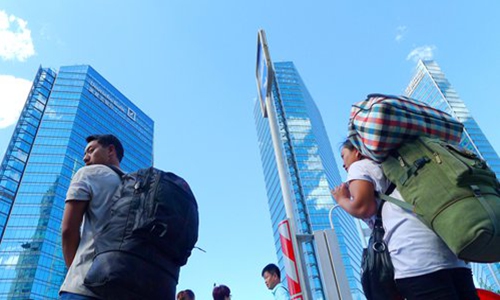HOME >> CHINA
China to ease urban hukou restrictions for migrant workers
By Cao Siqi Source:Globaltimes.cn Published: 2020/4/10 1:53:59

Migrant workers at Beijing's CBD district File Photo: VCG
China announced it would ease restrictions on household registration or hukou, and allow rural residents to apply for urban household status so they can have access to the same public services that permanent urban residents have, according to a guideline released Thursday.
The guideline was issued by the Communist Party of China (CPC) Central Committee and the State Council and aimed at improving the market-based allocation mechanism of production factors to stimulate market vitality.
China will deepen reform on the household registration system, according to the guideline.
As part of the planned economy, under the hukou system, a person is assigned a residence jurisdiction that determines access to education, motor vehicles, and social welfare services.
China will explore ways to take the lead in realizing mutual recognition of the cumulative number of years for household registration in urban areas like the Yangtze River Delta and the Pearl River Delta, said the guideline.
Gao Ziping, a professor at Shanghai Academy of Social Sciences specializing in human resources studies, told the Global Times that realizing mutual recognition of people's cumulative number of years for household registration meets the demand for frequent labor flow in city clusters and coordinated industrial development.
The purpose is to allow laborers to feel that the contributions they have made to regional devolvement will grant them equal rights, Gao said. More importantly, it will help lift barriers between migrant workers and local residents, Gao stressed.
As globalization is promoted by cities instead of transitional companies, it is necessary to remove barriers that restrict labor flow.
For example, obtaining Shanghai hukou is a long process for most migrant workers who need to hold a "Shanghai Residence Permit" for seven years before they can apply for hukou. Once mutual recognition is realized, it means the time that these workers have lived in cities nearby Shanghai can be included in as part of the "seven years". In other words, they no longer need to stay in Shanghai for seven years to become qualified hukou applicants.
Meanwhile, restrictions on urban household registration, except in megacities, will be relaxed. Migrant workers will be granted hukou based on their habitual residence, the guideline said, which Guan Xinping, an expert on social policy at Nankai University in Tianjin, said would help migrant workers enjoy the same public benefits such as medical insurance and education as local residents.
Detailed regulations for various cities will be released based on their situations, such as how many years should a migrant worker live in a city before they're considered a habitual resident or how much tax they should pay.
Also, on Thursday, a document released by the National Development and Reform Commission said cities with a population under 3 million should remove barriers for rural residents to apply for urban household registration status.
For cities with a population of over 3 million, restrictions should be eased for groups such as migrant workers with stable jobs and college students from rural areas, according to the document.
The document also instructed local governments to promote basic public services, such as healthcare, education, and housing for those already living in cities without hukou, including their family members.
Under the national plan for a new type of urbanization, China set a goal to help 100 million rural residents and others living in cities without hukou to settle in cities and towns from 2014 to 2020.
By November 2019, all the 31 provincial-level regions across the Chinese mainland had rolled out policies to reform the hukou system.
City governments have reformed the hukou system to allow those confined to rural hukou to obtain urban hukou.
Posted in: SOCIETY